News
Learning the language is one of the biggest challenges and most rewarding achievements of living in another country. That’s especially true of a minority language like Slovene, with little global presence, a very limited supply of media, and even less motivation to learn if you live in a place, like Ljubljana, where you can get by in English. So we sent some questions to Bojana Petkovič, of the language school Jezikovno Mesto, with branches in Ljubljana and Maribor, to find out more about her work and how she teaches people to speak Slovene.
How long have you been teaching Slovene, and when did you open your school?
I started to teach Slovene six years ago. I started to give lessons to Spanish and Czech speaking students, as I studied those two languages at University. Then I had opportunity to teach students who came to EVS exchange, and had two groups in two years that I really enjoyed teaching my native language. I am very touched when I hear my students talking in Slovene.
I’ve taught languages for 12 years. I started when I was student. I had great opportunity to teach in six private language schools (at the same time) and also in four public schools (primary school and high school). So I gained a lot of experience how to teach and I also observed how are courses organised in different schools. Then I decided to open my language school in 2016.
I want to offer good experience with learning languages, a lot of opportunities for communication and to get rid of their fears talking in a foreign language. I am very happy the school is growing so fast and so many people trust us and continue learning in new semesters. Some students have been with us for three years, always improving their language skills.
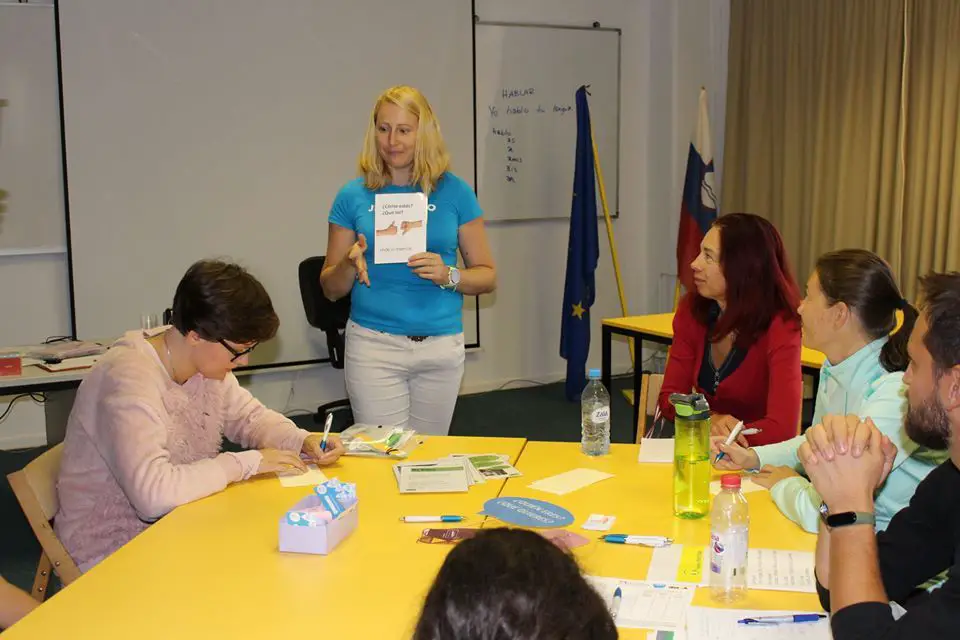
People say that Slovenian is one of the hardest languages to learn. What are your thoughts?
I partly agree. Every language has its difficulties. As a polyglot (I’ve learned seven languages) I can compare them. For example, in English what’s difficult is spelling (speaking and writing are not the same), in Slavic languages we have declination (skloni), in Spanish, Italian, Portuguese and French it’s difficult to choose the right past tense or conjunctive mode.
So while it’s is true that in Slovene are a lot of combination of endings but it is not impossible to learn. It takes time to improve by speaking.
Can you tell us about the typical experiences of foreigners who come to you to learn Slovenian as total beginners, what are the main problems they face?
It takes time to improve by speaking the language, by using it in everyday situations. Maybe it is also difficult to get the stress (which is not always on the same syllable). Students can quickly learn words from everyday vocabulary – what they need (beer, one more please, coffee, bus, …). So we start with topics they are familiar with. Words we use in a context. In our school we prepare materials for playing games and activities and so students are learning in fun way.
When people stop learning on a course it’s very important that they find people to talk with them in Slovene. It doesn’t matter if they don’t use the right endings, it’s about communication in the language. So besides regular courses we also provide courses for conversation, so they can practice and lose their fear of speaking in Slovene.
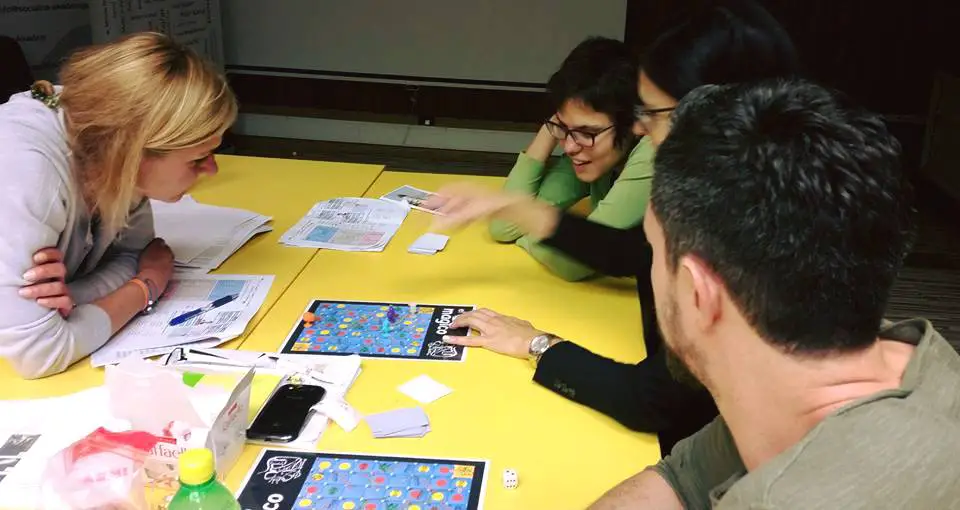
So many foreigners seem to have a mental block about learning Slovenian, especially if they can live and work here without learning the language. How do you 'unblock' that mentality?
We all face with this situation differently. It depends a lot on individual situation, but the learning process is very important. We start with the basics, with simple words, and then we put words together in a sentence. Later we make simple dialogs.
It’s also important that there’s positive feedback from teacher, so that students gain confidence. Teachers also appreciate instant feedback from students, so they can adapt the lesson to them, as maybe they just need a different explanation or more exercises to understand something.
We use a lot of visual material, such as pictures, movies, PowerPoint, colours, cards. I think the most important thing is that our students feel comfortable in their group. So we laugh, we joke and such positive vibes are very important.
Finally, students need to feel a need to learn a foreign language, otherwise they don’t have motivation. And some of this can be done by the teacher, who creates different, useful and interesting tasks for the class and homework.
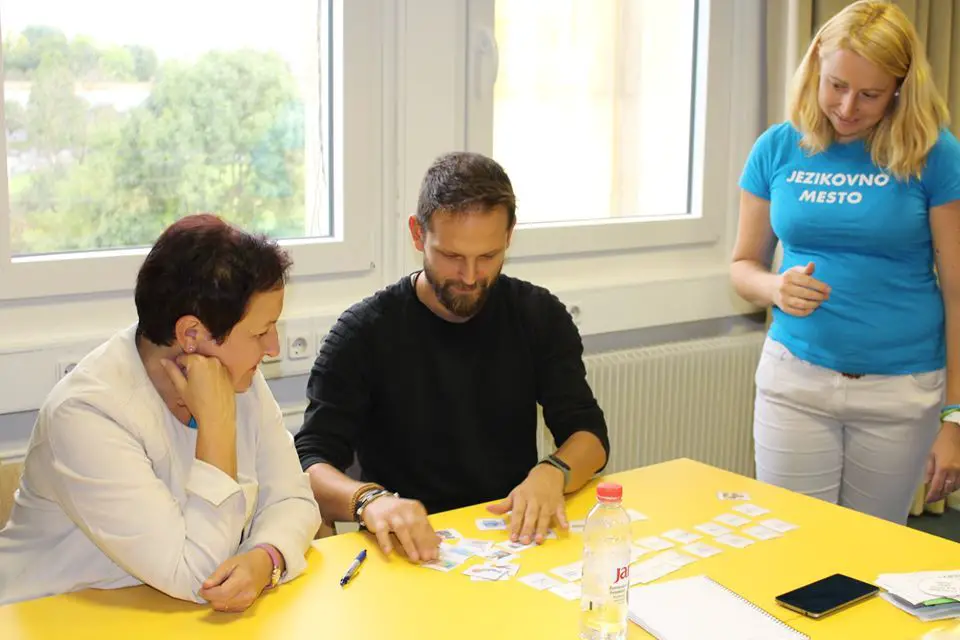
What do you find difficult about speaking English?
I think the spelling and writing are pretty difficult, as well as the pronunciation. English has a lot of synonyms and use a lot of phrasal verbs (look for, look forward, look out, look up …). And different accents -- British English, American English – and a lot of non-native speakers with their own versions.
Learning Slovene is a serious business. Why should people sign up for a course, and what’s on offer with your language school?
First of all, they need a desire to learn, they need to feel that they need this language. To go to good language course is a shortcut to learning a new language. It’s awesome that students can learn language from their experiences – and we also very much support learning outside the classroom, looking at signs, listening to people, reading articles in Slovene, listening to the radio – but it is easier if someone prepares material for you and guides you through the learning process.
In my language school, Jezikovno Mesto, we organise group and individual courses. We have courses for beginners, intermediate levels, we prepare for certificates A2/B1 and B2/C1, and also very popular is the conversation course (Pogovarjajmo se po slovensko). We are teaching in small groups (4 to 8 students) so the teacher can dedicate time to every student. As I mentioned before, we use communicative methods, and we prepare activities, so students can learn by playing games and trying to do different tasks in pairs or smaller groups. The material we prepare is based on everyday situations and it is for all three types of students: Visual ones (they need to see), Kinesthetic (they need to move or to touch material, “words” on cards) and Auditive (they need to hear).
What’s your advice for people learning Slovenian and thinking about giving up?
They can find out what they already know and can use this as a basis to encourage themselves that it’s not impossible to learn. Stop comparing themself to other students, everybody has their own path). Find new reasons to continue with learning. Maybe find some new person to talk to, watch TV in Slovene, watch your favourite movie and read the subtitles in Slovene. It’s important to have good attitude towards the Slovene language. And of course go to group course, so the group will support you and teacher will lead you to the next level. In short, try and have fun with Slovene.

What are some Slovenian cultural products that foreigners who learn the language should be aware of?
I like the book of Noah Charney – Slovenologija (they should read it first in English and then in Slovene). It’s about his experiences becoming a Slovenian husband. Now there’s also a also very popular book called Belo se pere na 90 (Bronja Žakelj). For youngsters there are the books of Desa Muck. But in fact there are many good books, it just depends on the age of the reader and the level of their Slovene.
I also think we have a lot of good music in Slovene, and we listen to Slovenian songs on the courses, such as those by Nina Pušlar, Tabu, Alya, Siddharta, Vlado Kreslin, Big Foot Mama, Kingston, Dan D, and so on.
You can learn more about Bojana Petkovič and Jezikovno Mesto - in both Ljubljana and Maribor - here, while all our stories on the Slovenian language are here
At a joint press conference in Hungary and Slovenia today, November 13, the circumstances of the largest quantity of heroin ever seized in Slovenia since its independence were been presented to the public.
Slovenian and Hungarian authorities uncovered an international criminal organization and arrested several suspects.
In October 2019, officers of the Financial Administration of the Republic of Slovenia (FURS) assessed a shipment of 437 rolls of polyethylene film (total weight 21,530 kg) that arrived in a container at the Port of Koper as suspicious. The container appeared to be coming from the United Arab Emirates and was transhipped in Egypt.
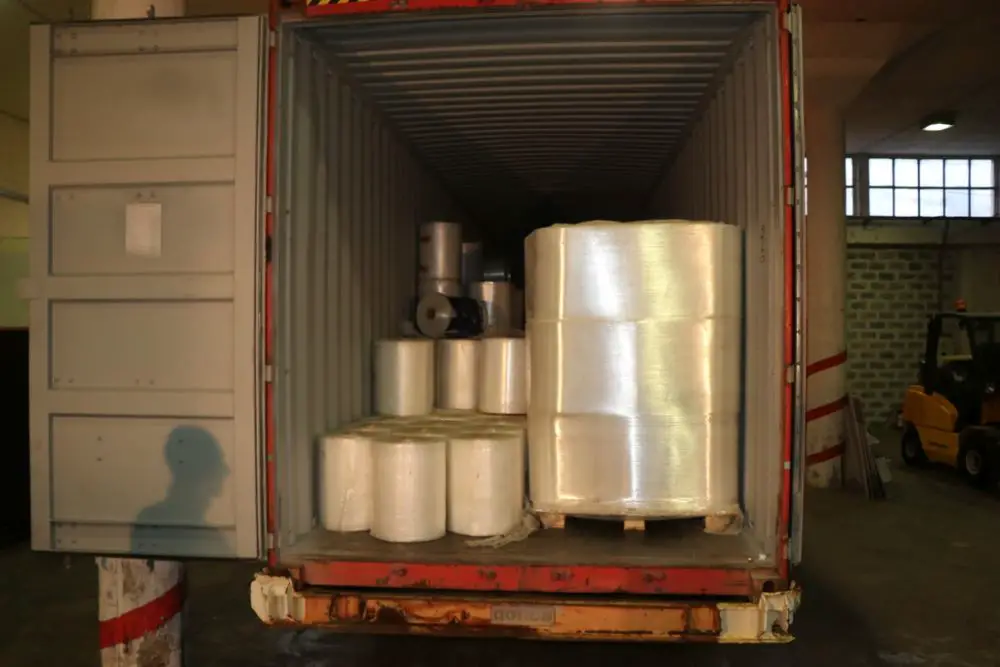
An X-ray scan of the cargo on October 29 revealed possible irregularities in the shipment and additional controls were ordered. Further documentation checks suggested the shipment actually originated from Iran and was headed to a company address in Hungary.
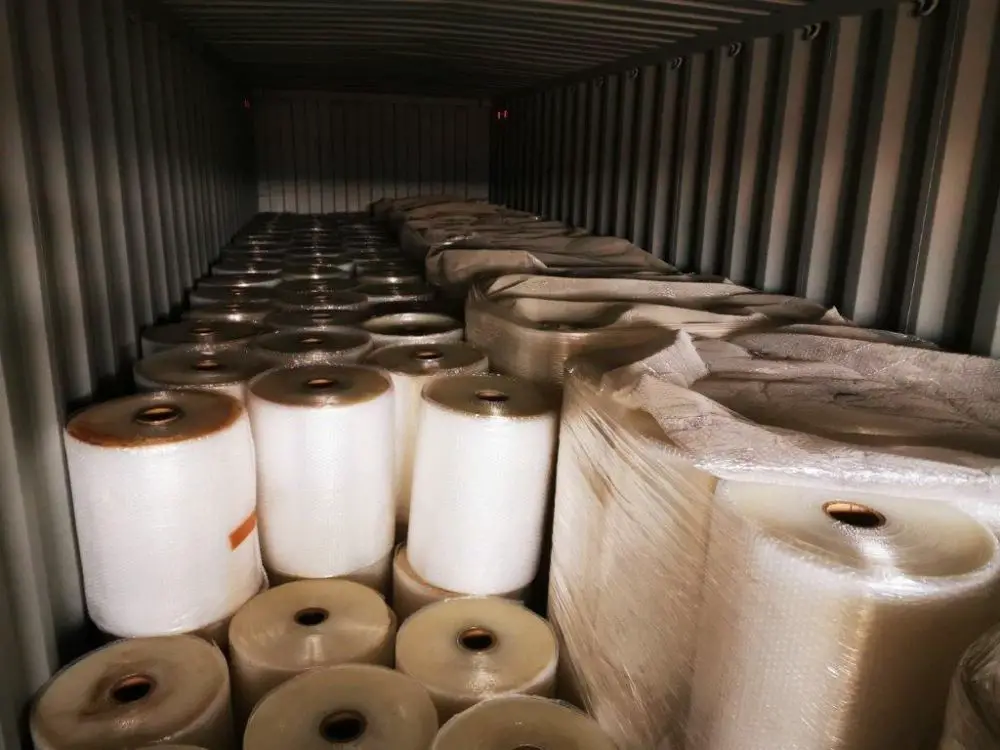
Physical examination of goods was ordered and a FURS sniffer dog was employed, both bringing to discovery packages hiding in some of the rolls. When a preliminary drug test suggested it was heroin, FURS informed Koper Police Department, which took over further investigation.
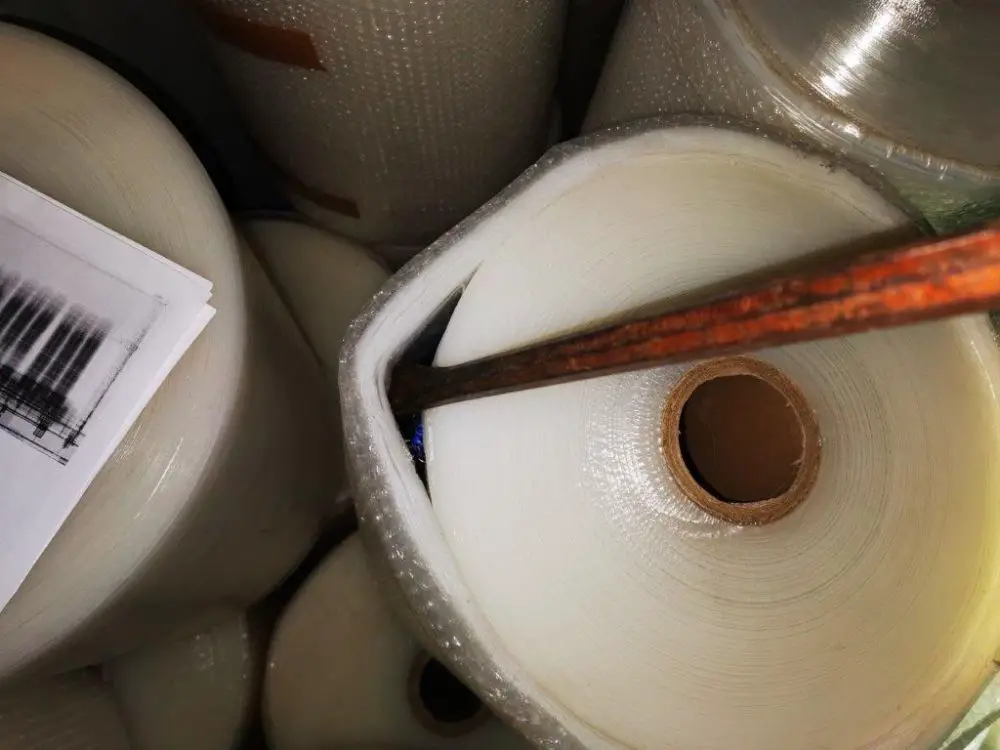
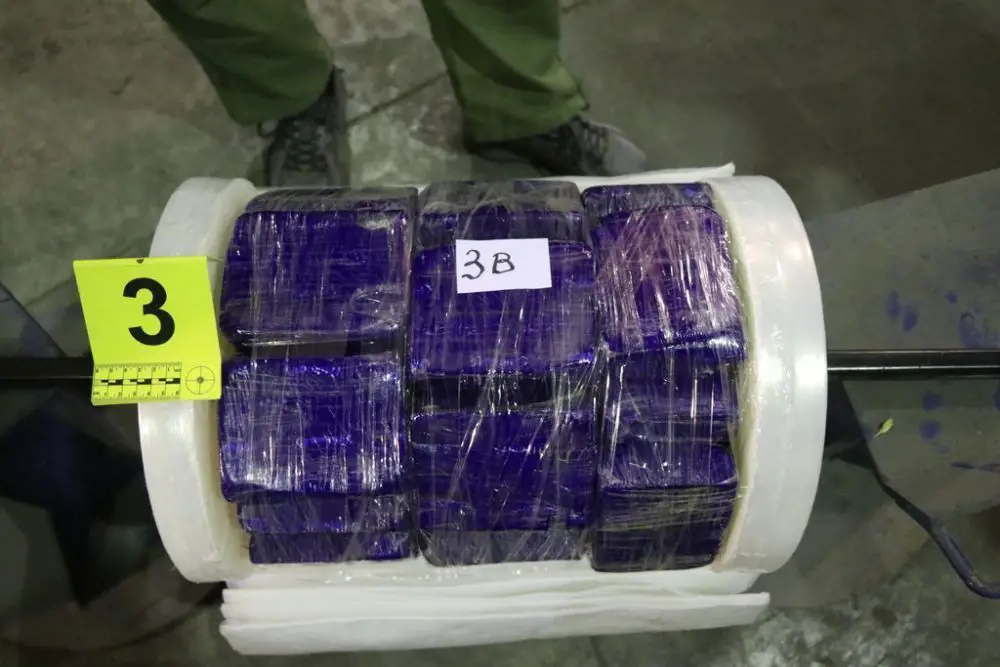
A criminal investigation revealed that 42 of the 437 rolls differed from the rest by weight, and turned out to contain 1,421 packages of heroin with a total weight of just under 730 kg.
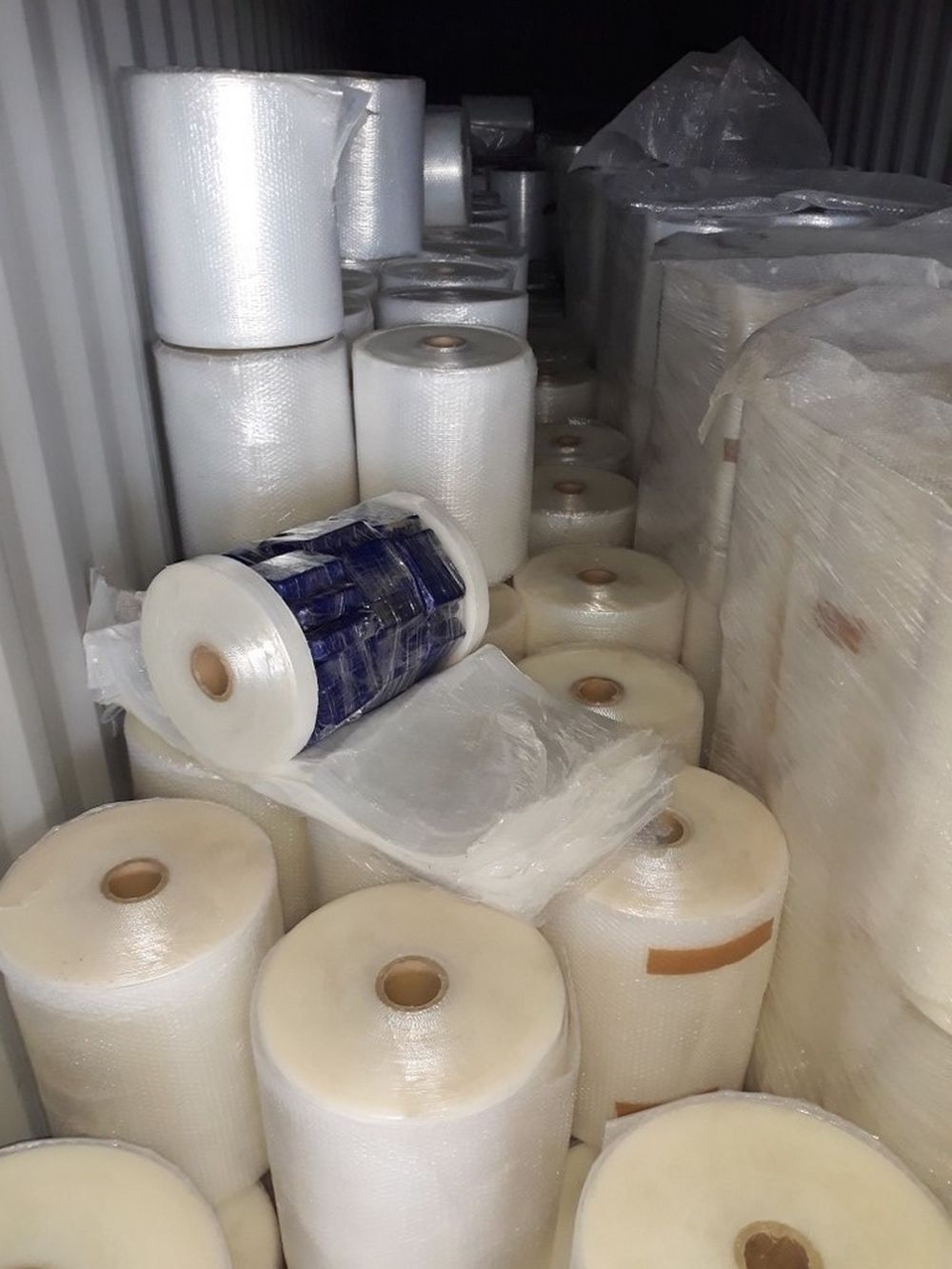
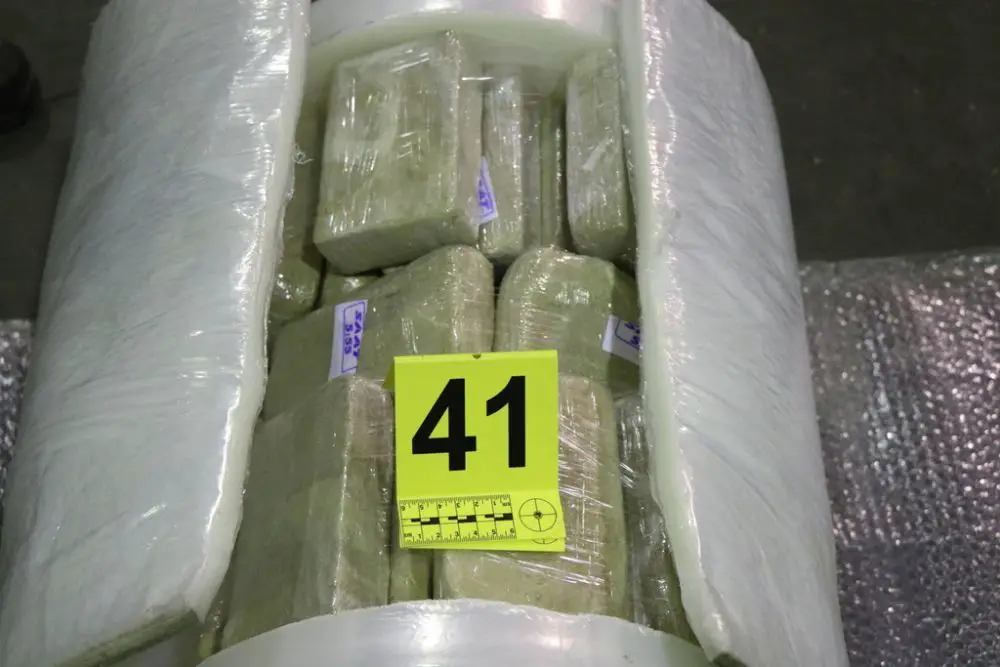
Based on the findings that the container was being sent to a Hungarian company from Budapest, Slovenian police contacted their Hungarian counterparts with a request for the identification of the recipient of the drugs. A reply was received about a criminal investigation of organised crime suspects who were expecting an arrival of a large amount of illicit drugs.
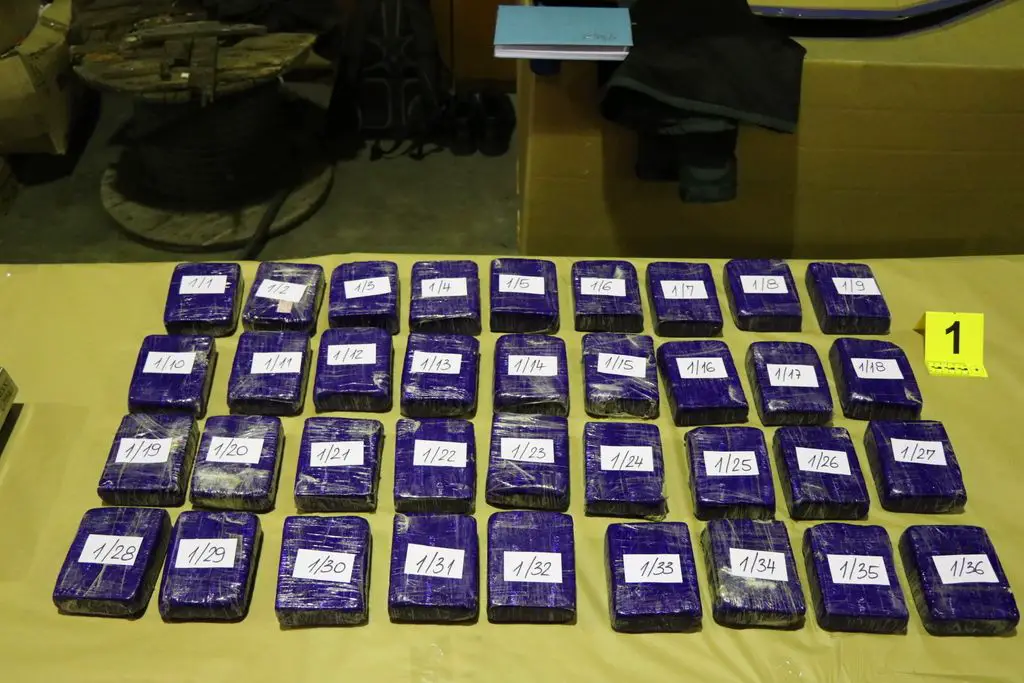
A trap for the crime group was then set up by Slovenian and Hungarian police; 134 packages of the drug (about 70 kg) were returned to the PVC rolls and the container was sealed and sent to its destination in Budapest. The container was under constant control of the Slovenian police units and their Hungarian counterparts after it crossed the border.
The shipment was received in Budapest and allowed the police to arrest several members of the organised crime group. A total of 661 of the 730 kilograms of the drug of high purity (about 70%) were seized by the Slovenian authorities. The street value of the shipment could reach up to €85 million.
This is the largest single heroin seizure In Slovenia by far. In contrast, authorities seized 345 kg in the entire year of 2018.
The 30th edition of LiFFe – the Ljubljana International Film Festival – opens today and continues until 24 November, with over 100 films on the programme and screenings in the capital and Maribor, Celje and Novo Mesto.
The first edition, back in pre-independence 1990, was led by Jelka Stergel, who today heads the Slovenian Film Festival, and showed just 13 titles. The programming director is now Simon Popek, and while the schedule has grown the aim remains the same, to present the international art cinema in Slovenia.
Note - this is an international film festival, so do check the language and the subtitles
The programme, which can be seen in full here, is divided into sections. There’s a competition section, called Perspectives, Kings and Queens, which shows the biggest art house hits of the previous year, and Avantpremieres, for first screenings in Slovenia. There are also the Panorama and Extravaganza sections, which highlight lesser known names and genre production, respectively, with dystopian, futuristic South American films getting plenty of screen time this year. Along with these there are short films, children’s films and a focus on films from Cuba. Slovenian titles also be featured, including Gregor Božič's Stories from the Chestnut Woods, which premiered at the 2019 Toronto Film Festival and won 11 Vesnas, the Slovenian “Oscars”.
More details can be found on the clear and easy to navigate website
STA, 12 November 2019 - The ultralight electric aircraft maker Pipistrel confirmed on Tuesday that it had submitted a bid for the Adria Airways flight school, which is part of the bankruptcy estate of the former flag carrier. Pipistrel is bidding for the school as a whole, including all its assets, brand and licence.
A day after the call for bids for Adria assets came to a conclusion, Pipistrel owner Ivo Boscarol told the STA that the company wanted to keep the pilot school at Brnik airport and also expand it to Maribor airport.
"Pipistrel already has its own aviation academy but we would like to upgrade it with Adria's and merge them," said Boscarol.
The plan is to move Pipistrel's aviation academy, now based in Ajdovščina, to Brnik and in part to Maribor airport, with the latter being very suitable for pilot training, both at the beginners' level as well as advanced, according to Boscarol.
He said that Pipistrel had decided to bid because Adria's flight school had a very good reputation. "The Adria brand stood for high-quality training and we want it to stay in Slovenian hands," he said.
The merger with Pipistrel's aviation academy would also benefit the Adria flight school, which would get an on-line academy, allowing advanced training to pilots for large aircraft.
Moreover, some of Adria's students have already switched to Pipistrel after the receivership was launched in late September, and so did some of the Adria instructors, he added.
Adria Airways receiver Janez Pustatičnik announced today that five bids came in for the flag carrier's estate. He also said that he would meet with potential buyers on Thursday and Friday and that one bidder was from abroad.
According to public broadcaster TV Slovenija, bids have also been submitted by another two Slovenian entrepreneurs.
Joc Pečečnik, who owns a gaming products maker, has submitted a bid for the entire estate in cooperation with a partner from abroad.
The business newspaper Finance meanwhile said that Pečenik's plan was to build a new Adria with the help of the carrier's former CEO Mark Anžur.
Meanwhile, produce importer and real estate developer Izet Rastoder is bidding for the carrier's air operator's certificate (AOC), the licence that permits commercial flying.
STA, 13 November 2019 - The coastal towns of Piran, Izola and Koper were flooded during the night due to heavy rain and a combination of a cyclone, southerly wind and full moon, which caused an exceptionally high tide. According to unofficial information, the sea level reached the second highest point in the last 50 years.
Alarms went off in the coastal towns, whose old city centres were under water. In some parts, the water level was 60 centimetres high. The worst hit was Izola.
Major flooding in Piran, Slovenia this evening associated with intense southerly winds from the cyclone over the Mediterranean and high tide! Notice the person walking in deep water. Video by Bojana Francuz pic.twitter.com/Eu3UkjZ13y
— severe-weather.EU (@severeweatherEU) November 12, 2019
According to Koper's tide gauge, the sea level reached 373 centimetres last evening, which the Environment Agency said was a rare phenomenon.
Firefighters were busy all night and their efforts continue as the sea level is expected to rise again this morning, so anti-flooding barriers are being set up.
The Environment Agency expects some 20-40 centimetres of water in the low-lying parts of the cost this morning.
Heavy rain and strong winds caused problems in other parts of the country as well during the night, especially in the north-east and in the west. Rivers may burst their banks today, especially in Slovenian Istria and parts of Primorska.
STA, 12 November 2019 - The mayor of Velenje has appealed to Prime Minister Marjan Šarec to prevent the head office of the household appliances maker Gorenje being moved to Ljubljana as planned by its new Chinese owners.
Mayor Bojan Kontič sees the plans, announced by Gorenje in late October, as yet another step to centralisation, which he says is one of Slovenia's key problems.
A press release from the Velenje city said that the mayor's letter of protest had been forwarded to Chinese Ambassador to Slovenia Wang Shunqing, Economy Minister Zdravko Počivalšek, Chamber of Commerce and Industry chairman Boštjan Gorjup and the media.
The reaction comes after Gorenje announced it would split up into two companies as part of its integration a year after it was taken over by Hisense.
The management and administration was to move to Hisense Europe, headquartered in Ljubljana, which was to provide corporate support services for all Hisense companies in Europe.
Production was to remain based in Velenje, now Slovenia's sixth largest city where Gorenje has been operating since its inception in 1950.
The release from the city administration expressed concern over the latest activities and plans in what has been the pillar of the local economy for seven decades and one of Slovenia's largest exporters.
"The current situation at the company, the new management's plans and the mood among the employees are far from the promises and commitments the new owners made upon the takeover," reads the release.
The local government met Gorenje chief managing director Chao Liu and representatives of the staff and their trade union in recent days over what it described in today's release as a critical situation.
The employees are worried and scared because of conflicting information about the company's plans and future, which they do not get until after they have become facts, say the city authorities.
"Due to substantial pressure on stepping up the work tempo, sickness absences are getting longer, increasingly many qualified staff is leaving, employees, including those with disabilities are being made redundant, and discontent among the employees is growing by the day."
Arguing that moving highly-qualified staff to Ljubljana does not augur well, the city authorities say they believe the Gorenje management can run the company as well as it stays in Velenje.
The local authorities are also concerned about Gorenje's plan to move its call centre to Serbia, saying it suggests the management was planning to keep only production at minimum possible costs in Velenje.
In response to the mayor's letter, Gorenje said that calls on the prime minister to interfere in business decisions of a fully privately-owned company were unjustified and illegitimate.
The company is planning to accept the invitation to join the December session of the city council in order to present Hisense's plans in detail.
Gorenje expressed understanding for the local community's concerns, while it also said that it fund the local community's support and cooperation exceptionally important.
The company said that Slovenia would gain from the creation of Hisense management hub for the whole Europe in Ljubljana.
The owner is organising the company in such a way as to integrate it into the Hisense corporation's business environment, while also restructuring operations in order to preserve the company and to allow it to grow in the long run, Gorenje said.
It added that this should be in the interest of the municipality in which Gorenje with more than 4,000 employees was becoming Hisense's central production location for the entire Europe.
Check the date at the top of the page, and you can find all the "morning headlines" stories here. You can also follow us on Facebook and get all the news in your feed.
A schedule of all the main events involving Slovenia this week can be found here
This summary is provided by the STA:
Slovenia likely to introduce preferential vote
LJUBLJANA - After another meeting of parliamentary parties on electoral law changes, it seems that Slovenia will be introducing a preferential vote system. Public Administration Minister Rudi Medved said after the meeting that the proposal enjoyed sufficient support to be passed in parliament, with the SocDems coming on board for the change. This comes after several meetings hosted, like the one today, by President Borut Pahor after the Constitutional Court decided earlier this year that electoral district borders had changed through the years to a degree that no longer guaranteed the one person-one vote principle.
Slovenia commended for progress in human rights protection
GENEVA, Switzerland - Slovenia presented the progress it made in human rights protection in the past five years at the third round meeting of the UN Human Rights Council (HRC). The member states praised Slovenia for meeting almost all of suggested targets given to the country during the previous review round - 138 out of 142. Highligted was progress in strengthening national institutions for human rights protection, in particular the offices of the human rights ombudsman and equal opportunities ombudsman, as well as the adoption national action plans for protection of women, peace and security as well as human rights in the economy.
Pipistrel wants to buy Adria's pilot training school as five bids are submitted
AJDOVŠČINA - The ultralight electric aircraft maker Pipistrel confirmed that it had submitted a bid for the Adria Airways flight school, which is part of the bankruptcy estate of the former flag carrier. Pipistrel is bidding for the school as a whole, including all its assets, brand and licence. A day after the call for bids for Adria assets closed, receiver Janez Pustatičnik announced that five bids came in, with the media reporting that bids had also been submitted by Joc Pečečnik, who owns a gaming products maker, and produce importer and real estate developer Izet Rastoder. The former is interested in the entire estate, while the latter is bidding for the carrier's air operator's certificate (AOC).
Erjavec says Macron's NATO brain death comment unhelpful
BRUSSELS, Belgium - Defence Minister Karl Erjavec said after a meeting with his EU counterparts that the recent statement by French President Emmanuel Macron about NATO being brain dead was not helpful. The defence ministers shared the view that cooperation between the EU and NATO had never been as good, and Erjavec said that there was a clear emphasis today that NATO needed to be nurtured and strengthened. When asked about the impact of Macron's statement, Erjavec said that the ministers were happy with French Defence Minister Florence Parly expressing support for transatlantic cooperation and pointing to a number of shared challenges.
Civil society turns to OECD over hydraulic fracturing in Slovenia
LJUBLJANA - Several civil initiatives turned to the OECD over the plans of the British oil and gas exploration company Ascent Resources for hydraulic fracturing in eastern Slovenia. The move comes after the company announced it would demand massive damages from Slovenia for delays in obtaining a permit for the controversial gas extraction project. The civil initiatives and organisations filed a complaint with the Slovenian and British national contact points for the OECD guidelines for multinational enterprises, demanding that Ascent Resources fully adhere to the guidelines.
Slovenia to join another PESCO defence project
BRUSSELS, Belgium - An additional 13 projects have been confirmed as part of the Permanent Structured Cooperation on Security and Defence (PESCO), including a project in which Slovenia will participate, as the EU defence ministers met in Brussels Slovenia has so far been participating in three projects as part of the partnership involving all EU member states except the UK, Denmark and Malta, and has been present in another five as observer. Slovenia, Croatia, Hungary and Austria signed a programme agreement for a project in nuclear, chemical, radiological and biological oversight as a service which will be operated by Austria. Defence Minister Karl Erjavec said that the project was about drones supplying data on the situation on the ground, adding that Slovenian small and medium-sized enterprises (SMEs) could participate, and could be joined by research institutes in what is an excellent opportunity.
Velenje protests as Gorenje moves HQ to Ljubljana
VELENJE - The mayor of Velenje has appealed to Prime Minister Marjan Šarec to prevent the head office of the household appliances maker Gorenje being moved to Ljubljana as planned by its new Chinese owners. Mayor Bojan Kontič sees the plans, announced by Gorenje in late October, as yet another step to centralisation, which he says is one of Slovenia's key problems. The mayor's letter of protest was forwarded to Chinese Ambassador to Slovenia Wang Shunqing, Economy Minister Zdravko Počivalšek, Chamber of Commerce and Industry chairman Boštjan Gorjup and the media. In a responbse, Gorenje said that calls on the prime minister to interfere in business decisions of a fully privately-owned company were unjustified and illegitimate.
Slovenian logistics forging business ties in South Korea
SEOUL, South Korea - A delegation of 18 Slovenian companies active in maritime, transport and logistics have been visiting South Korea's capital since Monday for a series of meetings with prospective business partners. The visit is being organised by the transport section of the Chamber of Commerce and Industry (GZS) and the SPIRIT agency for promotion of entrepreneurship and investment. The GZS said the Slovenian delegation is meeting Korean shipping and logistics companies, forwarding agents, port community companies, industrial companies, export and import companies and traders interested in Slovenian transport and logistic services.
Conviction of ex-bankers overturned
MARIBOR - The Maribor Higher Court has overturned the January conviction of two executives of the now defunct bank Probanka, who had been found guilty of fraud, quoting serious violations of procedure. Romana Pajenk, CEO of Probanka until September 2012, and Milana Lah, a member of her board, had received suspended sentences of 23 months with a four-year probation for defrauding two businessmen at the height of the economic and financial crisis. The case will now go into retrial.
Slovenian tourism: New records, old challenges
LJUBLJANA - Slovenian tourism is in for another record year in terms of arrivals and nights by foreign tourists, even if growth rates are slowing down in Slovenia and globally. And while some goals from the 2017-2021 national tourism strategy have already been achieved, there is still a lot to be done in terms of revenue and company restructuring. Arrivals and nights by foreign tourists grew this year until August, by 7.1% and 3.5%, respectively, and revenue from foreign tourists rose by 3% to EUR 1.9 billion until the end of August, Economy Minister Zdravko Počivalšek said at the Days of Slovenian Tourism, the main tourism industry event in the country.
Ljubljana hosting Creative Forum
LJUBLJANA - The 2nd Creative Forum Ljubljana got under way, bringing together 200 participants from 20 countries in an effort to promote creative economy. The forum will focus on the Western Balkans and the Southern Mediterranean. The forum, running until Friday, is hosted by the Foreign Ministry, the Union for the Mediterranean, and GIZ, the German Agency for International Cooperation. It will feature representatives of creative hubs, entrepreneurs, civil society, international institutions and local organisations as well as high representatives of EU institutions and ministries from both regions.
Planica Nordic Centre gets award for sports architecture
LJUBLJANA - The designers of the Planica Nordic Centre in north-eastern Slovenia has received a gold medal for an architectural achievement by the International Olympic Committee (IOC) and the International Association for Sports and Leisure Facilities (IAKS). The Nordic skiing complex with one ski flying hill, seven ski jumping hills and a cross-country skiing track is one of the seven recipients of the gold medals among a total of 98 competing projects.
What speaks of the success of the Planica Nordic Centre is that the award for an architectural achievement in the past went to the likes of Beijing National Stadium, also called The Bird's Nest, and National Stadium in Singapore.
Actor Vlado Novak honoured with Bert for lifetime achievements
LJUBLJANA - Theatre and film actor Vlado Novak has been honoured by the Slovenian Directors' Guild with the Bert award for lifetime achievements in film and in theatre. The jury praised him as an actor par excellence, and an indispensable figure of Slovenian cinema. Novak, 67, has starred in more than 60 films, which is a lot by Slovenian standards, yet much less than over 120 roles he has played in theatre. In 2014, Novak was honoured with the Borštnik Ring, the highest award for theatre acting given out by Slovenian theatre professionals.
Off road, Roglič honoured with yet another trophy
LJUBLJANA - After winning a series of cycling trophies, Slovenia's rider Primož Roglič has now also been honoured by the Slovenian tourism community for his contribution to Slovenia's promotion worldwide. At the annual Days of Slovenian Tourism, Roglič won the Crystal Triglav as the person who made the biggest contribution to Slovenia's international recognisability in the past year. Roglič, a Jumbo-Visma rider, clinched a series of key victories this year, including at the Vuelta, Tour de Romandie, the premiere UAE Tour and the Tirreno-Adriatico race, finishing third at the Giro d'Italia.
Slovenian culinary scene to get Michelin Guide
LJUBLJANA - The first Slovenian Michelin reference guide for restaurants will be published in March next year. Maja Pak, the head of the Slovenian Tourism Board (STO), told the press the guide will strengthen the position of Slovenia as a culinary destination for high-end guests. According to Michelin sales and marketing director Romain Perrier, the guide's food critics have been assessing restaurants in Slovenia for the past year. The tourist board will invest EUR 425,000 per year in the next two years into promotion and development activities in cooperation with Michelin. A year ago, another renowned culinary guide, Gault & Millau, entered the Slovenian culinary scene.
Visiting Ljubljana? Check out what's on this week, while all our stories on Slovenia, from newest to oldest, are here
If you're learning Slovenian then you can find all our dual texts here
STA, 12 November 2019 - Slovenian tourism is in for another record year in terms of arrivals and nights by foreign tourists, even if growth rates are slowing down in Slovenia and globally. And while some goals from the 2017-2021 national tourism strategy have already been achieved, there is still a lot to be done in terms of revenue and company restructuring.
Arrivals and nights by foreign tourists grew this year until August, by 7.1% and 3.5%, respectively, and revenue from foreign tourists rose by 3% to EUR 1.9 billion until the end of August, Economy Minister Zdravko Počivalšek told the press in Ljubljana on Tuesday.
This means two goals were already achieved in 2018, arrivals and nights, he said at the Days of Slovenian Tourism, the main tourism industry event in the country.
However, "the main goal of the strategy is EUR 3.7-4 billion in revenue from foreign tourists, which means a lot of hard work until the end of this period," he added.
Compared to the baseline year 2016, revenue from foreign tourists rose by 24% to EUR 2.7 billion in 2018, and only by another 3% since last year.
?Na Dnevih slovenskega turizma o projektih in izzivih, ki bodo spreminjali prihodnost slovenskega turizma #DST2019
— Slovenia Tourism (@tourism_slo) November 12, 2019
?Podrobnejši program so predstavili gostje na današnji novinarski konferenci v prostorih Grand Hotela Union.
?Več informacij➡️https://t.co/dX4cxtKRkk pic.twitter.com/UFBsog9bfW
Počivalšek also presented some other priorities: efforts to restructure state-owned tourism companies; making hospitality legislation more flexible; and public calls.
He said everything had been done to prepare the ground for the transfer of ownership and management of state-owned tourism companies to a state-owned fund.
Nevertheless, the minister said it was hard to say when this would actually happen, noting a plurality of different interests.
As for legislation, he said the hospitality sector needed simpler and fresher legislation that would enable it to develop gastronomy.
The ministry is also planning new calls for applications to distribute EUR 5.5 million to leading destinations in the coming two years.
Three million euro will be available for new products, EUR 21 million to make tourist accommodation and restaurants energy efficient and another EUR 5 million for the same purpose for mountain cottages.
Počivalšek also said that in 2017-2018, the state spent EUR 17.3 million on 121 projects that should bring 185 new or upgraded tourist products plus 190 new jobs.
Speaking at the same news conference, Slovenian Tourism Association head Pavle Hevka stressed tourism was the most important sector of economy for Slovenia.
He believes it facilitates quality development to the capital city, as well other smaller and bigger towns, villages and even more remote parts of the country.
Slovenian Tourist Board (STO) director Maja Pak said the STO would continue to focus on digital advertising, working with journalists and influencers.
It will moreover present Slovenia at global tourist and other events, including Expo in Dubai and the Olympic Games in Tokyo, while also planning to use Slovenia's EU presidency in 2021 as a promotional opportunity. Gastronomy will also be an area in the focus in the next two years.
This year's Days of Slovenian Tourism are organised by all leading partners in the industry under the wing of the STO.
STA, 11 November 2019 - The Koper District Court sentenced on Monday Marko Matić to a maximum, 30-year prison sentence for the murder of his 75-year-old stepsister and his 83-year-old husband in Krkavče in August 2018. Judge Julijan Glavina said the motive for the brutal and cold-blooded murder was personal gain. The ruling is not final yet.
Matić was found guilty of the double murder, and got 25 years for each of the murders, which translated into a joint 30-year sentence, as the prosecution demanded.
Neither Matić nor his lawyer were present in court today.
During the trial, the prosecution had presented evidence that Matić's family was in dispute with his stepsister's family over land deals.
The murdered couple sold some land to Matić's family ten years ago but did not receive the money for it in full, so a court later annulled the sale. But prior to this, the Matićs transferred some of that land to one of their sons, who used it as collateral for a loan.
Since the son did not pay back the loan, the land was to be seized, and last February even the house of Matić's stepsister was to be auctioned off.
The disputes were being processed in court and police had to intervene between the two families on several occasions, media have reported.
The 71-year-old Matić committed the double murder on 4 August 2018 with a blunt object. He first attacked the 83-year-old, who died at the scene, and then his 75-year-old wife, who later died in hospital. He was seen at the crime scene by a neighbour, whom he urged to call the police. He did not resist the arrest and showed no remorse throughout the trial.
His defence claimed he had acted in self-defence.
In 1920 the Rapallo Treaty was signed by the Kingdom of Serbs, Croats and Slovenes (Kingdom of SCS, in 1929 renamed the Kingdom of Yugoslavia) and the Kingdom of Italy in Rapallo. The treaty defined a border between the two countries, assigning one third of the Slovene ethnic territory, Istria and part of Dalmatia, to Italy, which in turn recognized the Kingdom of SCS.
Along the Rapallo border, the Slovenian population of the former Austro-Hungarian Empire was divided into two parts. Slovenes who lived in Gorizia, part of Inner Carniola, Trieste, Istria and the Littoral were soon to experience the pressure of increasing fascism.
Italy entered WWI due to an alliance with Germany and Austro-Hungary that it had been part of since 1882. At the start of hostilities it refused to commit troops, claiming that the alliance was defensive in nature and that Austro-Hungary was the aggressor.
In 1915 Italy changed sides after the Triple Entente (France, Russia and Great Britain) promised it parts of the Austro-Hungarian territories under the secrecy of the so-called London Agreement (Italian: Patto di Londra), signed on April 26, 1915 by the representatives of Italy, the United Kingdom, France and Russia.
Italy pledged to declare war on the Central Powers, which it did less than a month later, on May 23, and was in return promised the following territories in case of the Entente’s victory:
Trst (Trieste), Trento, Gorica, Istria, Protectorate over Albania, the port of Vlorë, Dodecanese Islands, Zadar, parts of Dalmatia, the Soča River Valley and Southern Tyrol.
The agreement became public with the fall of Tsarist Russia, when Vladimir Lenin, a fierce opponent of war and secret diplomacy, in 1917 publically declared that the new Soviet state no longer recognized the Agreement.
In a new international situation that followed with the war’s end in 1918 the United States became involved as well. President Woodrow Wilson rejected Italian claims for Dalmatia, but agreed that the Slovenian Littoral and much of Istria, including Pula, belong to Italy.
Backed with such an international support Italy headed to Rapallo in 1920, where it was to sign a peace deal with a newly established, not yet recognised state.
About one-third of the Slovene ethnic territory remained outside the country of origin, all of Istria, Rijeka and Zadar with their immediate hinterland. The aforementioned territories immediately received a strong wave of violent Italianization through fascist attacks, arson, imprisonment, torture, internment and killing of Slovenes and Croats. Tens of thousands were expelled to southern Italy, and more than one hundred thousand were forced to flee to Yugoslavia and other countries.
A reminder that Vintgar Gorge, one of the many attractions clustered around Bled, will soon be closing for the winter season, with the last days you can access the bridges and galleries to view this natural wonder being November 16 and 17 (2019) – this weekend. After that the only view you’ll be able to get is from the railway bridge, with the area closed until spring and the completion of any work that needs to be done before reopening, with that date usually being around the end of April or beginning of May.
.Still, there’s plenty more to see in the area, including many other hiking trials, and details of those can be found on the rather slow loading page here.





